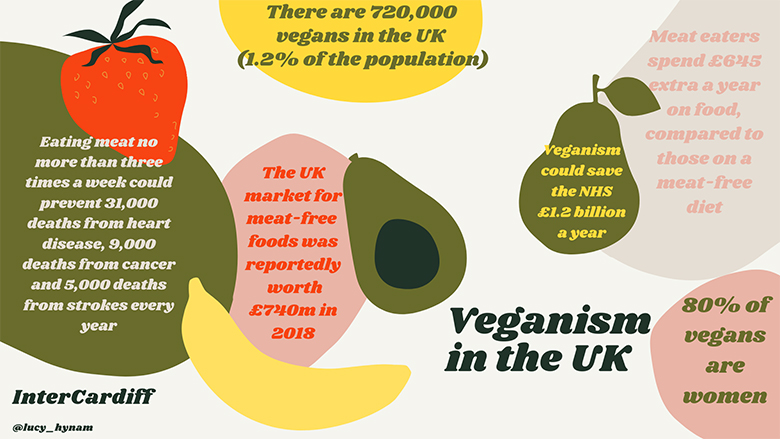Despite veganism growing in popularity in the UK, research suggests that 80% of vegans are women. Why are plant-based diets still so split?

Abi Thomas is used to comments about her veganism. “A woman at work always used to comment on my size and say I needed more meat on my bones,” said Abi. She did not ask for her opinion, but the women gave it nonetheless. She would always comment that she ‘didn’t agree with veganism’ and that ‘men liked women who ate steaks’.
Though the woman tried to pass it off in a jokey manner, Abi’s experience represents one of many vegans.
When Abi Thomas used to tell people she was vegan, she faced ignorance and confusion. Now, she is mainly met with curiosity and politeness. “They still tell me they could never do it mostly,” she said.
The number of vegans in the UK has quadrupled since 2014, rising from 150,000 to nearly 720,000 in 2020. Although the number is increasing every year, vegans still only make up 1.2% of the population.
There has also been a growth in plant-based alternatives. UBS research found that the number of people who tried meat substitutes increased from 48% to 53% between March and November in 2020. More than half said that they would definitely eat meat-free options at least once a week in the future.

Despite the rise of veganism, 80% of vegans are still women. “I think it’s because there are more female influencers who exist in the realms of ‘sustainable living’,” said Abi. She believes that traditional perceptions of women also play a role.
“A higher percentage of female vegans could be related to societal notions of perceived femininity/traits we traditionally associate with women, i.e., being caring, nurturing, docile,” said Abi.
Abi thinks laziness could also explain the gender gap within the veganism movement. “Younger boys who still live at home and are used to having food prepared for them by parents and are, therefore, reluctant to try new things,” said Abi.
Veganism could have huge benefits for the planet. It is estimated that if the world went vegan, 8 million human lives could be saved by 2050 through rising sea levels. It could also reduce greenhouse emissions by two-thirds and avoid climate damages of $1.5 trillion.
It is not only the environment that could benefit from veganism. As a recent study involving 48,000 people over 18 years found, those who followed vegan and vegetarian diets had a lower risk of heart diseases. There was a 32% lower risk for those with higher intakes of plant-based foods for cardiovascular disease.
This may leave you wondering, if all of this is true why are there not more vegans? Academics point a finger at the feminization of veganism as the cause of this.

Veganism is often presented to women as a way to achieve idealised body types. Vegan books that focus on weight loss are often geared towards women, as feminists such as Carol J. Adams believe that society views women as sexual resources for men, and women have over time internalised these gender norms.
When it comes to veganism the focus is very often on the diet, specifically on ‘restriction’. Although there is evidence that a vegan diet can lead to weight loss, the misrepresentation of veganism can often devalue the movement to little more than a fad ‘diet’. Academic Matthew Cole believes that this leads to ‘misunderstanding and misrepresentation of the meaning of veganism for vegans’.
Daniel opposed the opinion that veganism is just a way to lose weight. “I went vegan for the animals but also for the environment,” said Daniel Greenway, “It’s just an added benefit that I feel a lot healthier being vegan as well.”

Daniel said that the belief that you won’t get enough protein from a vegan or vegetarian diet is also reinforced in the media.
“I think men are scared about what other men care about, but I just don’t really care,” said Daniel, “also, there’s a lot of false information out there regarding how much protein you can get from a vegan diet.”
These misconceptions that you won’t get enough protein with a plant-based diet put a lot of people off veganism. Even though foods such as seitan, tofu, lentils, and chickpeas are great sources of protein.
Despite all this evidence that with careful consideration a vegan diet can provide you with enough protein, Abi believes many ‘gym lads’ won’t make the switch. “I think there’s a stigma around protein, ‘Gym lads’ fear that they wouldn’t get enough protein from a vegan diet, plus it wouldn’t fit in with the image of the culture,” said Abi.
Abi explained that: “They get so defensive about the way they liked their steaks cooked – ie ‘what the best way to cook it is’, how rare they like it, etc. I think this is a small component in a larger culture of fragile masculinity.”
The association is complex but there is a long history of meat being tied to protein, which is linked to strength and muscle growth. Essentially attaching meat to societal notions of masculinity.
“I think men have been conditioned to eat in a particular way, one that is masculine and almost Neanderthal-like,” said Abi.
Notions of meat and masculinity can be tied to the Neolithic period which began around 10,000 BCE. During this time analysis on bones suggested women and men ate very similar diets. However, by the Bronze age, women began eating more wheat and barley. As a result, women’s bones deteriorated, and they lost muscle mass. Thus, begun the view of women as weaker, second-class citizens to men. Abi believed this shows how entrenched with masculinity meat has become over thousands of years.

Carol J. Adams argued in her book The Sexual Politics of Meat in 1999 that the media targeted meat as a symbol of masculinity to boost sales. This has resulted in men and teenage boys eating more meat than any other demographic, according to a U.S. National Health and Nutrition Examination Survey.
Many are trying to change the narrative that masculinity is tied to meat. With films such as The Game Changers challenging the stereotype that meat is crucial for strength and health. Including famous athletes and bodybuilders such as Arnold Schwarzenegger.
Beyond Meat, who make the famous ‘Beyond Burger’, have many professional plant-based ambassadors for the brand such as basketball player Kyrie Irving. They aim to break down the assumption that you need meat to be strong, by highlighting plant-based athletes at the top of their game. Other plant-based athletes include tennis player Venus Williams, Formula 1 driver Lewis Hamilton, and American football player Colin Kaepernick.
There is evidence that more and more men are turning to veganism as Bupa Health found in a recent study that men 24% of men hitting milestone birthdays (40s, 50s) had decided to change their diet.
Activists and nutritionists are slowly closing the information gap on the importance of meat for protein and removing the stereotype that veganism is a women’s movement.
Before considering a vegan diet it is good to look into if it’s right for you and how to do it healthily!
